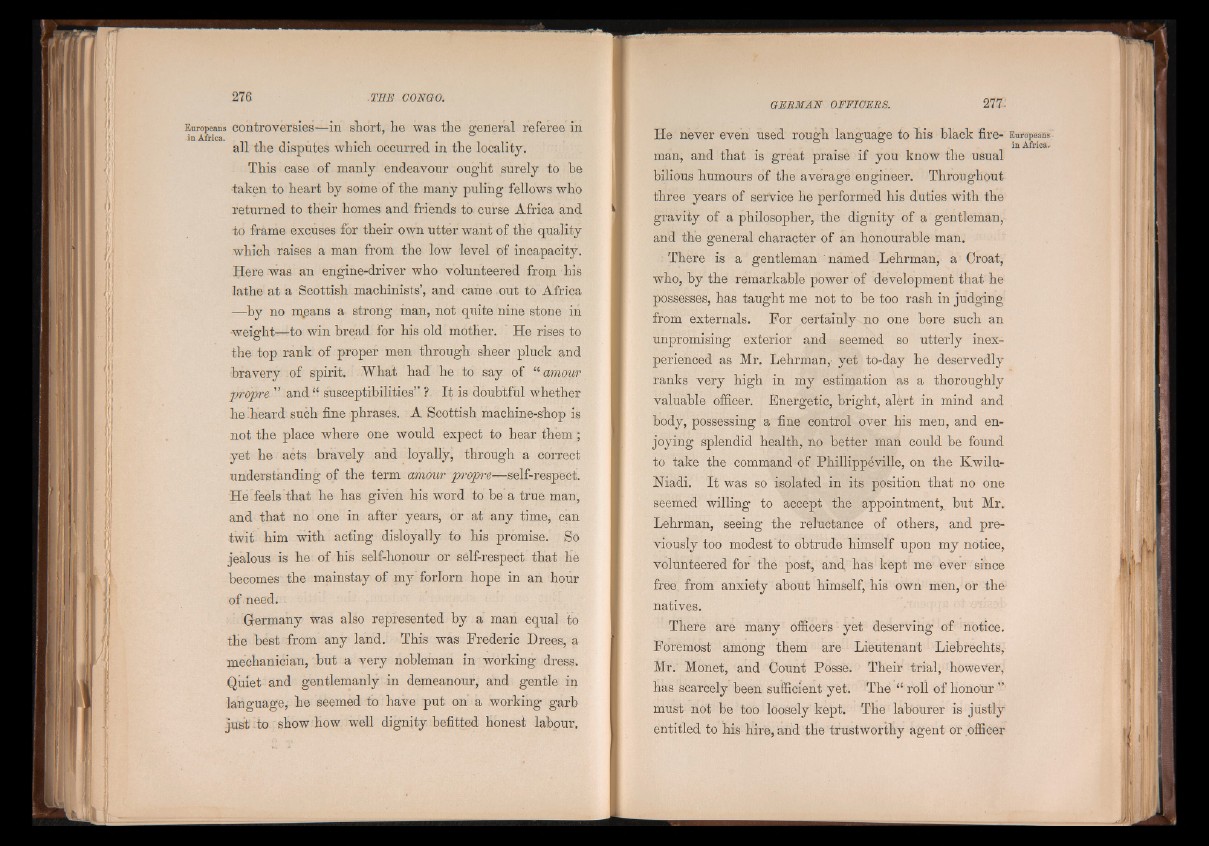
Europeans controversies—in short, he was the general referee in
in Africa. \
all the disputes which occurred in the locality.
This case of manly endeavour ought surely to be
taken to heart by some of the many puling fellows who
returned to their homes and friends to. curse Africa and
to frame excuses for their own utter want of the quality
which raises a man from the low level of incapacity.
Here was an engine-driver who volunteered from his
lathe at a Scottish machinists’, and came out to Africa
—by no means a strong man, not quite nine stone in
weight—to win bread for his old mother. He rises to
the top rank of proper men through sheer pluck and
bravery of spirit. What had he to say of “ amour
propre ” and ft susceptibilities” ? It is doubtful wbetber
be beard such fine phrases. A Scottish machine-shop is
not the place where one would expect to hear them ;
yet he acts bravely and loyally, through a correct
understanding of the term amour jwopre—self-respect.
He feels that he has given his word to be a true man,
and that no one in after years, or at any time, can
twit him with acting disloyally to his promise. So
jealous is he of his self-honour or self-respect that he
becomes the mainstay of my forlorn hope in an hour
of need.
Glermany was also represented by a man equal to
the best from any land. This was Frederic Drees, a
mechanician, but a very nobleman in working dress.
Quiet and gentlemanly in demeanour, and gentle in
language,' he seemed to have put on a working garb
just to show how well dignity befitted honest labour.
He never even used rough language to his black fireman,
and that is great praise if you know the usual
bilious humours of the average engineer. Throughout
three years of service he performed his duties with the
gravity of a philosopher, the dignity of a gentleman,
and the general character of an honourable man.
There is a gentleman named Lehrman, a Croat,
who, by the remarkable power of development that he
possesses, has taught me not to be too rash in judging
from externals. For certainly no one bore such an
unpromising exterior and seemed so utterly inexperienced
as Mr. Lehrman,' yet to-day he deservedly
ranks very high in my estimation as a thoroughly
valuable officer. Energetic, bright, alert in mind and
body, possessing a fine control over his men, and enjoying
splendid health, no better man could be found
to take the command of Phillippeville, on the Kwilu-
Niadi. It was so isolated in its position that no one
seemed willing to accept the appointment^ but Mr.
Lehrman, seeing the reluctance of others, and previously
too modest to obtrude himself upon my notice,
volunteered for the post, and has kept me ever since
free, from anxiety about himself, his own men, or the
natives.
There are many officers yet deserving of notice.
Foremost among them are Lieutenant Liebrechts,
Mr. Monet, and Count Posse. Their trial, however,
has scarcely been sufficient yet. The “ roll of honour ”
must not be too loosely kept. The labourer is justly
entitled to his hire, and the trustworthy agent or officer
Européans
in Africa^